How did you sleep last night? When you’re asked this question, you might respond by saying, ‘really well’ or ‘not great, I kept waking up, or it took me ages to drift off.’ If you have a sleep tracker, you can expand your answer by revealing how many hours of sleep you had, when you fell asleep, how much REM sleep you got, your heart rate and if you snored.
What is a sleep tracker?
A sleep tracker is a device or app which monitors and records sleeping patterns. It’s designed to help you discover more about your sleep, to improve it. Trackers have become de rigueur in recent years for various reasons:
- Trackers are a tech trend, with trackers for health and exercise also being popular
- They provide measurable insights which can help with your overall wellbeing, not just sleep
- The element of gamification can be a draw for some with sleep scores being a motivation for improvement
- Athletes use sleep trackers to help with their performance

What are the types of sleep trackers?
Sleep trackers have evolved from their humble fitness band beginnings and now come in various forms. There are wearable watches, bedside clocks, smart rings, apps on your phone and smart home devices. They’re effective at spotting patterns, sleep stages, sleep duration and how certain habits such as caffeine or exercise affect your slumber. Features like measuring your heart rate can help to detect early warning signs for your health, but as with any technology, a sleep tracker can make mistakes. They have been known to confuse lying in bed with light sleep, and for this reason, they should not replace medical advice on sleep disorders. Could they be the missing link between you and a good night’s sleep?
How do sleep trackers work?
With such sophisticated technology collating metrics during a passive state, how do sleep trackers work?
- Accelerometers – detect body movement using motion sensors, which help it to understand when you’re awake, asleep or restless
- An optical heart rate monitor measures heartbeats by shining a light on your skin to detect changes in heart rate
- Temperature sensors – monitor sleep temperature changes
- Microphones – analyse breathing sounds, snoring and talking in your sleep to estimate your sleep stage
Consumer-grade sleep trackers are only able to estimate sleep stages and sleep health, and are therefore not an accurate measurement.
Are sleep trackers accurate?
To answer the question, are sleep trackers accurate? You’d need to compare them with polysomnography, also known as a sleep study. Considered the gold standard of sleep measurement, these tests are performed in a lab by medical professionals. Performed at night to determine if someone has a sleep disorder, they can confirm common ones such as sleep apnea and insomnia, and even rare disorders such as Exploding Head Syndrome (EHS). Polysomnography tests:
- Brain activity (EEG)
- Eye Movements (EOG)
- Limb movement
- Heart rate
- Oxygen levels
In comparison, sleep trackers monitor your sleep in your home environment, and they can provide statistics on:
- Estimated total sleep time
- Sleep stages – light, deep, REM
- Sleep quality
Sleep trackers are good at estimating sleep duration, and when you went to bed and when you got up, but they’re weak at identifying the sleep stages. Pets and partners in your bed may affect the tracking; apps which rely on microphones or motion are less reliable as they only take a reading from sound or movement. Trackers alone are unable to diagnose sleep disorders.

Are sleep trackers worth it?
Yes! If you want to improve your quality of sleep by knowing how you slept and how many hours, then a sleep tracker is a worthy investment. The data will help you to improve your sleep patterns and behaviours. This, in turn, can prevent you from developing sleep disorders; however, if you believe you may already have one, a tracker will not be able to diagnose it. A sleep tracker does not replace medical advice.
One of our sleep panel experts, Dr. Ritz, believes sleep trackers can be a useful tool: “Sleep trackers can be really helpful for raising awareness around your routines. They give you an insight into patterns you might not otherwise notice, like how late-night scrolling or caffeine affects your rest. But it’s also important to remember that the data isn’t perfect and doesn’t replace how your body actually feels. For some people, tracking can lead to what we call “orthosomnia” - worrying so much about sleep that the anxiety keeps you awake. The key is to use trackers as a guide, not a verdict.”
Are sleep trackers safe?
In terms of your physical safety, a sleep tracker won’t pose a risk. Wristband and watch devices with nickel or silicone may cause a reaction for those with allergies to these materials. Trackers contain safe levels of the Bluetooth signals, not considered harmful to the health of the wearer.
If you’re worried about your privacy, trackers store your data, so if it’s an app that sells this to third parties, then your personal information could be at risk. It’s worth checking if it shares your data before signing up.
Sometimes, people find that data and tracking can affect them with anxiety, due to them not meeting their sleep goals.
Can sleep trackers detect sleep apnea?
Check your tech, as some advanced trackers or those with a pulse oximeter can show breathing irregularities – a sign of sleep apnea. A pulse oximeter is a sensor that tracks blood oxygen saturation (SpO₂). Apnea causes oxygen desaturation (brief drops in SpO₂), so the tracker should be able to pick up these events during sleep, flagging repeated patterns of drops.
Some devices can combine SpO₂, heart rate, and motion data to produce an “estimated oxygen variation” or “breathing disturbance index.” Although, to caveat, trackers may be unable to detect milder cases of sleep apnea. Therefore, a tracker only serves as a tool to raise awareness of sleep apnea, so you should consult your doctor for a confirmed diagnosis.
If you have been diagnosed with sleep apnea or believe you have the symptoms, our bamboo pillows can help alleviate them and improve your sleep quality. Designed with orthopaedic-grade memory foam contouring your head and neck, our bamboo pillows ensure neck and spine alignment while you’re sleeping. Good spinal alignment can reduce airway restriction, making it easier to breathe when lying down. Both our Memory Foam and Hybrid Bamboo Pillows have a soft bamboo cover which wicks away moisture and promotes airflow for a breathable night’s sleep.

What are the best sleep trackers?
As there are many different sleep trackers on the market, and you’ve decided you want to keep on top of your sleep, we’ve compiled a list of the best wearable and non-wearable devices.
Wearables:
-
Oura Ring (Gen 4) – the celeb-approved one. Oura Ring is a subscription-based device highly rated for comfort and long battery life, its sleep data at your fingertips! Hands down, the most accurate, the Oura Ring tracks sleep stages, HRV (heart rate variability) and body temperature. Good for those who travel a lot and want a discreet tracker that looks like jewellery. A hit with A-listers.
-
Whoop Strap 4.0 – a subscription-based tracker aimed at athletes, this watch is the device of the moment! Like a personal trainer on your wrist, it provides highly accurate data on sleep stages, heart rate, HRV, strain and recovery tracking. Perfect for sports professionals, team players and fitness enthusiasts.
-
Google Pixel Watch 3 – powered by Fitbit, this device is the one to watch. Best for those with an Android or Pixel phone. Before you’ve even had a sip of your morning coffee, it provides a brief on how you slept based on stages, HRV, resting heart rate, and SpO₂ variations overnight.
-
Garmin Venu 3 (and Epix Pro) – a smartwatch ahead of its time. Provides advanced sleep and fitness integration with actionable insights. Ideal for fitness enthusiasts and those who don’t want to sign up to a subscription.
-
Ultrahuman Ring Air – the Oura rival. This tracker could run rings around others. It’s a handy, lightweight ring with no subscription required. Provides strong accuracy for sleep stages, temperature and reliable sensor data. Designed for Android users, without a subscription, it’s ideal for those looking for an inconspicuous device to wear.
Non-wearable:
For those of you who don’t want to get too attached to your sleep tracker, we highly recommend these non-wearable options:
-
Google Nest Hub (2nd Gen) – for the Google native. A bedside tablet you can integrate with your streaming services. It feeds accurate sleep data to your other Google devices. The Nest provides weekly suggestions on how to improve your sleep. If you don’t want to wear a tracker to bed, it’s a great solution.
-
Withings Sleep Analyser – an under-mattress sleep sensor which tracks sleep cycles, heart rate and snoring, and even boasts medical-grade sleep apnea detection. It’s good for couples who both want to understand their sleep better.
Best sleep tracker apps for phones
There’s an app for everything, and the world of sleep is saturated with them, so we’ve narrowed down the best free ones. How apt.
-
Sleep Cycle – this tracker features an alarm clock, it wakes you up gently during the lightest part of your cycle, so you feel more refreshed. Monitoring your sleep patterns, including duration, quality and trends via microphone and accelerometer, the paid-for premium option unlocks detailed and more in-depth sleep analysis. Suited to Apple users, this app integrates with Apple Health. Other benefits include detailed visuals and an easy-to-use interface.
-
SleepScore – Unlike other apps, which use your phone’s microphone or accelerometer, this app uses sonar (bio-motion sensor technology). Your phone’s speaker emits inaudible sound waves that bounce off your body and return to the microphone; the app detects your breathing patterns and movement throughout the night. As the name suggests, it gives you a sleep score based on duration, quality and stages. Just like Sleep Cycle, it has a smart alarm to wake you during light phases. Suits those with a newer version of iOS or an Android due to its sonar technology, which does not work with old mobile phones.
-
Pillow – Made for Apple users. It tracks your sleep automatically when worn on the Apple Watch, or manually if you place your iPhone near you while sleeping. Gives sleep stage analysis, but also HRV, blood oxygen saturation (SpO₂) and syncs with Apple Health. It will send you bedtime reminders. Also, this clever little app has a smart alarm.
-
BetterSleep – A sleep and relaxation app. It plays customised sleep sounds to help you drift off and tells you bedtime stories. Uses your phone’s sleep sensors to track your sleep duration and quality. It has a smart alarm to wake you gently when sleeping in light stages. This app is best suited for those who struggle to fall asleep, but the tracking is not as accurate as Sleep Score, Sleep Cycle and Pillow.
Conclusion
For those of you struggling with an undisturbed night’s sleep or feeling constantly tired, a sleep tracker could be the wake up call to change your habits, as Dr. Ritz says: “Notice trends rather than obsessing over single nights. One poor night of sleep isn’t harmful, but consistent patterns are worth paying attention to. Use the data to support small, positive changes, like keeping a regular bedtime, creating a calming wind-down routine, doing your gratitudes and a body scan before bed or reducing screen time in the evening. Pair what the tracker shows with how you actually feel the next day. Over time, this helps you build a more intuitive relationship with rest, where the tracker supports your wellbeing rather than dictating it.”
Sleep trackers can provide useful insights into your sleep patterns, from the different sleep stages and periods of restlessness. While they aren’t medical devices and may not always be 100% accurate, they can help you identify habits or lifestyle factors that affect your sleep. Used as a tool alongside good sleep hygiene and, if needed, professional guidance, sleep trackers can be a valuable step toward better rest—but they shouldn’t replace medical advice for serious sleep issues like sleep apnea or insomnia. From apps to bedside tablets, there’s a tracker for every kind of sleeper.

![[MattressTopper] Panda London Memory Foam Bamboo Mattress Topper package box](http://pandalondon.com/cdn/shop/files/Bamboo_Mattress_Topper_Package_Box.webp?v=1742301823&width=1500)
![[MattressTopper] Panda London Memory Foam Bamboo Mattress Topper on the floor](http://pandalondon.com/cdn/shop/products/Panda-Memory-Foam-Bamboo-Mattress-Topper-Yoga-e1624045454555.jpg?v=1758795458&width=1000)
![[MattressTopper] Bamboo Mattress Topper Lifestyle Image with Memory Foam Pillows Product Page](http://pandalondon.com/cdn/shop/files/Bamboo_Mattress_Topper_Lifestyle_Image_with_Memory_Foam_Pillows_Product_Page.webp?v=1758795458&width=800)
![[MattressTopper] Bamboo Mattress Topper Lifestyle Image with Bamboo Pillows In the Garden room Product Page](http://pandalondon.com/cdn/shop/files/Bamboo_Mattress_Topper_Lifestyle_Image_with_Bamboo_Pillows_In_the_Garden_room_Product_Page.webp?v=1758795458&width=800)
![[MattressTopper] Panda London Memory Foam Bamboo Mattress Topper side](http://pandalondon.com/cdn/shop/files/Mattress_Topper_Isolated_-_resized.jpg?v=1758795458&width=800)
![[HybridMattressPro] Hybrid_Bamboo_Mattress_Pro_Product_Image_2026](http://pandalondon.com/cdn/shop/files/Hybrid_Bamboo_Mattress_Pro_Product_Image_2026.webp?v=1764944771&width=1000)
![[HybridMattressPro] Breathable Hybrid Bamboo Mattress](http://pandalondon.com/cdn/shop/products/Breathable-Hybrid-Bamboo-Mattress.jpg?v=1764944771&width=1920)
![[HybridMattressPro] Hybrid Bamboo Mattress Pro Cover Zip](http://pandalondon.com/cdn/shop/files/Hybrid_Bamboo_Mattress_Cover.jpg?v=1764944771&width=800)
![[HybridMattressPro] Panda Hybrid Bamboo Mattress Pro](http://pandalondon.com/cdn/shop/files/Hybrid_Bambo_Memory_Foam_Mattress_-_BioCell_Foam_x.jpg?v=1764944771&width=800)
![[HybridMattressPro] Couple on a Hybrid Bamboo Mattress Pro](http://pandalondon.com/cdn/shop/files/Hybrid_Bamboo_Mattress_Couple.jpg?v=1764944771&width=800)
![[CloudDuvet] Panda London The Cloud Bamboo Duvet Packaging](http://pandalondon.com/cdn/shop/products/Panda-London-The-Cloud-Bamboo-Duvet-Panda-Life-scaled_00a651ad-4ca3-4105-b520-12a94c1a4f71.jpg?v=1713363286&width=1920)
![[CloudDuvet] Panda London The Cloud Bamboo Duvet Rolled](http://pandalondon.com/cdn/shop/products/Duvet-Listing-Images03.jpg?v=1764079307&width=1000)
![[CloudDuvet] Panda London The Cloud Bamboo Duvet Girl Huggin a Duvet on the Bed](http://pandalondon.com/cdn/shop/files/Cloud_Bamboo_Duvet_-_Lady_Hugging_it_on_Bed_LifestyleImage.jpg?v=1764079307&width=1000)
![[CloudDuvet] Panda London The Cloud Bamboo Duvet Guy In the Air with Cloud Bamboo Duvet](http://pandalondon.com/cdn/shop/files/GuyonaHybridBambooMattresswithCloudDuvet.jpg?v=1764079307&width=2000)
![[CloudDuvet] Panda Cloud Duvet Winter on the bed lifestyle image](http://pandalondon.com/cdn/shop/files/Panda_Cloud_Duvet_Winter_on_the_Bed_Lifestyle-1_image.jpg?v=1764079307&width=1000)
![[BBWhite] White 100% Bamboo Bedding](http://pandalondon.com/cdn/shop/files/Pure_White_Full_Bed.webp?v=1719581797&width=1000)
![[BBWhite] White 100% Bamboo Bedding Texture](http://pandalondon.com/cdn/shop/files/100_Bamboo_Bedding_-_Pure_White_-_Close_Up_02.webp?v=1762879591&width=1000)
![[BBWhite] White 100% Bamboo Bedding Woman in bed sleeping](http://pandalondon.com/cdn/shop/files/100-Bamboo-Bedding-Set-Pure-White-BB.webp?v=1762879591&width=768)
![[BBWhite] White 100% Bamboo Bedding Woman Duvet cover buttons](http://pandalondon.com/cdn/shop/files/hand_and_buttons_1.webp?v=1762879591&width=1000)
![[BBWhite] White 100% Bamboo Bedding Woman in bed looking and smiling-](http://pandalondon.com/cdn/shop/files/SatonMadeBed-White100_BambooBedding-white_-_BB_SideShot1000x1000.webp?v=1762879591&width=980)
![[BBUrbanGrey] Urban Grey 100% Bamboo Bedding](http://pandalondon.com/cdn/shop/files/Made_Bed_-_Urban_Grey_-_Wide_Shot_2_1_1.webp?v=1762880019&width=1000)
![[BBUrbanGrey] Cloud Duvet Urban Grey 100% Bamboo Bedding Set](http://pandalondon.com/cdn/shop/files/Cloud_Duvet_-_Grey_-_Close_up_2.webp?v=1762880019&width=1000)
![[BBUrbanGrey] Urban Grey 100% Bamboo Bedding Set Woman sitting on the bed](http://pandalondon.com/cdn/shop/files/Sat_in_Bed_-_Grey_100__Bamboo_Bedding_-_Wide_Shot.webp?v=1762880019&width=1000)
![[BBUrbanGrey] Urban Grey 100% Bamboo Bedding Set Woman Duvet buttons Panda London](http://pandalondon.com/cdn/shop/files/hand_buttons_grey_bedding_1.webp?v=1762880019&width=1000)
![[BBUrbanGrey] Woman Sitting on the Bamboo Bedding with coffee](http://pandalondon.com/cdn/shop/files/SatonMadeBed-White100_BambooBedding-SideShot1000x1000.jpg?v=1762880019&width=1000)
![[BBNavyBlue] Deep Sea Navy Blue 100% Bamboo Bedding](http://pandalondon.com/cdn/shop/files/Made_Bed_-_Navy_-_Wide_Shot_3_copy.webp?v=1762879591&width=1000)
![[BBNavyBlue] Deep Sea Navy Blue 100% Bamboo Bedding Texture](http://pandalondon.com/cdn/shop/files/Cloud_Duvet_-_Navy_-_Close_up_2.webp?v=1762880019&width=1000)
![[BBNavyBlue] Deep Sea Navy Blue 100% Bamboo Bedding Woman Sitting on the bed](http://pandalondon.com/cdn/shop/files/Sat_Up_in_Bed_-_Navy_100__Bamboo_Bedding_-_Hands_on_Bed.webp?v=1762880019&width=1000)
![[BBNavyBlue] Deep Sea Navy Blue 100% Bamboo Bedding Duvet Cover Buttons](http://pandalondon.com/cdn/shop/files/Cloud_Duvet_Cover_Buttons_-_Deep_Sea_Navy.webp?v=1762880019&width=1000)
![[BBNavyBlue] Deep Sea Navy Blue 100% Bamboo Bedding Woman sitting on the bed looking away](http://pandalondon.com/cdn/shop/files/SatonMadeBed-White100_BambooBedding-SideShot1000x1000-001.webp?v=1762880019&width=980)
![[BBPink] Vintage Pink Blue 100% Bamboo Bedding](http://pandalondon.com/cdn/shop/files/Made_Bed_-_Pink_-_Wide_Shot_copy.webp?v=1762879591&width=1000)
![[BBPink] Vintage Pink Texture 100% Bamboo Bedding](http://pandalondon.com/cdn/shop/files/Cloud_Duvet_-_Pink_-_Close_up_2.webp?v=1762880019&width=1000)
![[BBPink] Vintage Pink Woman Sitting on the 100% Bamboo Bedding](http://pandalondon.com/cdn/shop/files/Sat_Up_in_Bed_-_Pink_-_Hands_on_Bed.webp?v=1762880019&width=1000)
![[BBPink] Vintage Pink Woman Sitting on the 100% Bamboo Bedding Duvet Cover](http://pandalondon.com/cdn/shop/files/Cloud_Duvet_Cover_Buttons_-_Vintage_Pink.webp?v=1762880019&width=1000)
![[BBPink] Vintage Pink Woman Sitting on the 100% Bamboo Bedding Woman looking far away](http://pandalondon.com/cdn/shop/files/SatonMadeBed-White100_BambooBedding-SideShot1000x1000-001_Vintage_Pink.webp?v=1762880019&width=980)
![[BBGrey] Light Grey 100% Bamboo Bedding](http://pandalondon.com/cdn/shop/files/Made_Bedding_in_Bedroom_-_Urban_Grey_-_Wide_Shot.webp?v=1762879591&width=1000)
![[BBGrey] Light Grey 100% Bamboo Bedding texture](http://pandalondon.com/cdn/shop/files/Texture17.webp?v=1762880019&width=1000)
![[BBGrey] Light Grey 100% Bamboo Bedding with Woman smiling](http://pandalondon.com/cdn/shop/files/Sat_Up_in_Bed_-_Grey_-_Hands_on_Bed.webp?v=1762880019&width=1000)
![[BBGrey] Light Grey 100% Bamboo Bedding with Duvet Cover buttons](http://pandalondon.com/cdn/shop/files/Cloud_Duvet_Cover_Buttons_-_Quiet_Grey.webp?v=1762880019&width=1000)
![[BBGrey] Light Grey 100% Bamboo Bedding with Woman smiling and sitting coffee](http://pandalondon.com/cdn/shop/files/SatonMadeBed-White100_BambooBedding-SideShot1000x1000-002-_Grey.webp?v=1762880019&width=980)
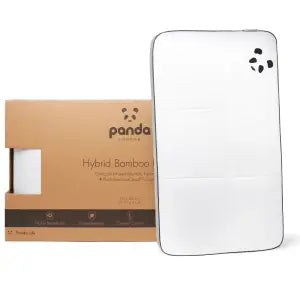 Hybrid Bamboo Pillow
Hybrid Bamboo Pillow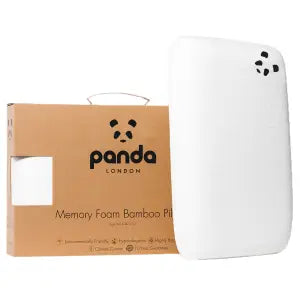 Memory Foam Bamboo Pillow
Memory Foam Bamboo Pillow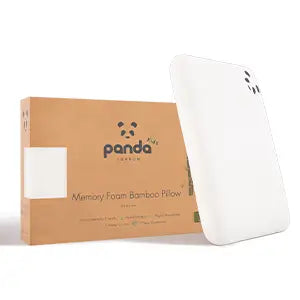 Kids Memory Foam Bamboo Pillow
Kids Memory Foam Bamboo Pillow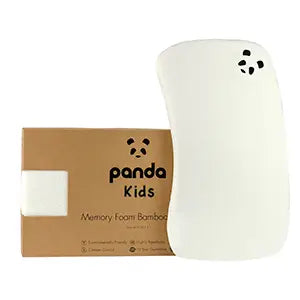 Baby Memory Foam Bamboo Pillow
Baby Memory Foam Bamboo Pillow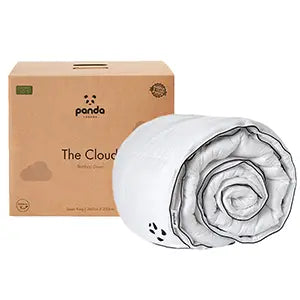 Panda Cloud Duvet
Panda Cloud Duvet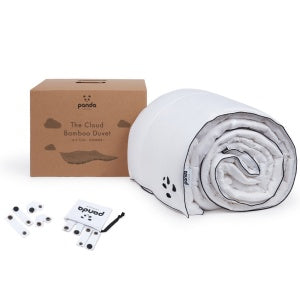 Bamboo Summer Duvet
Bamboo Summer Duvet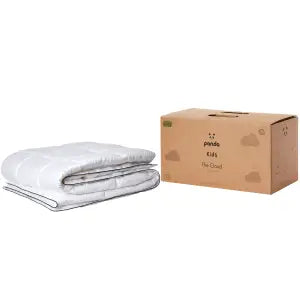 Kids Cloud Duvet
Kids Cloud Duvet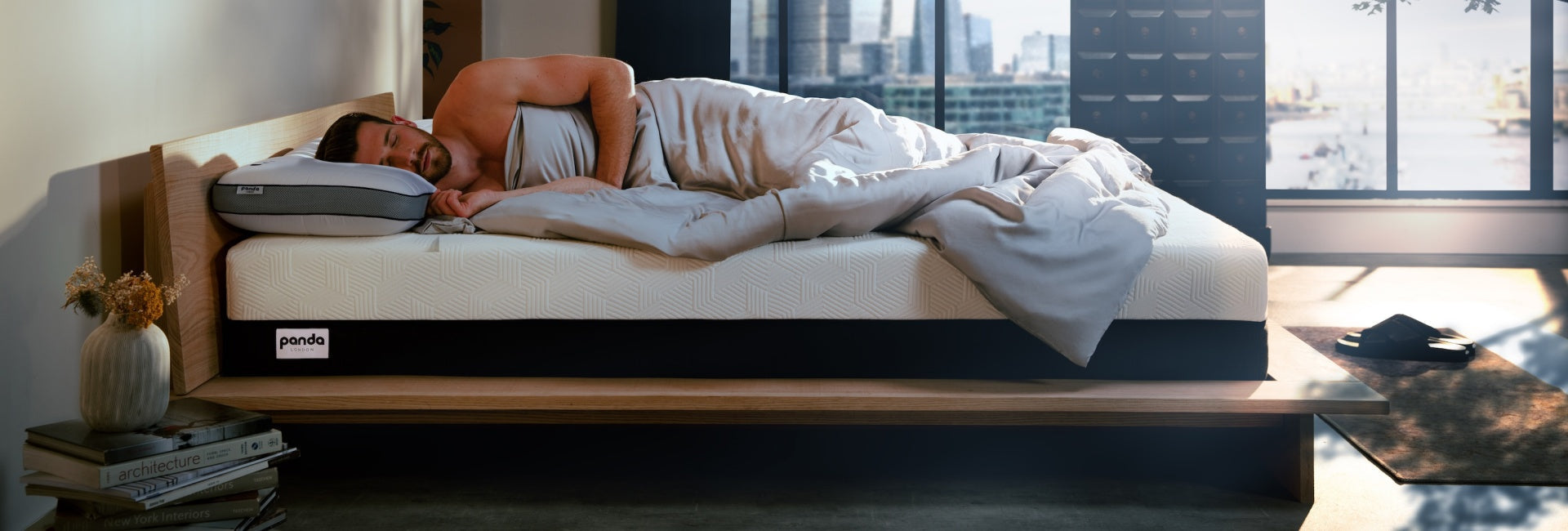
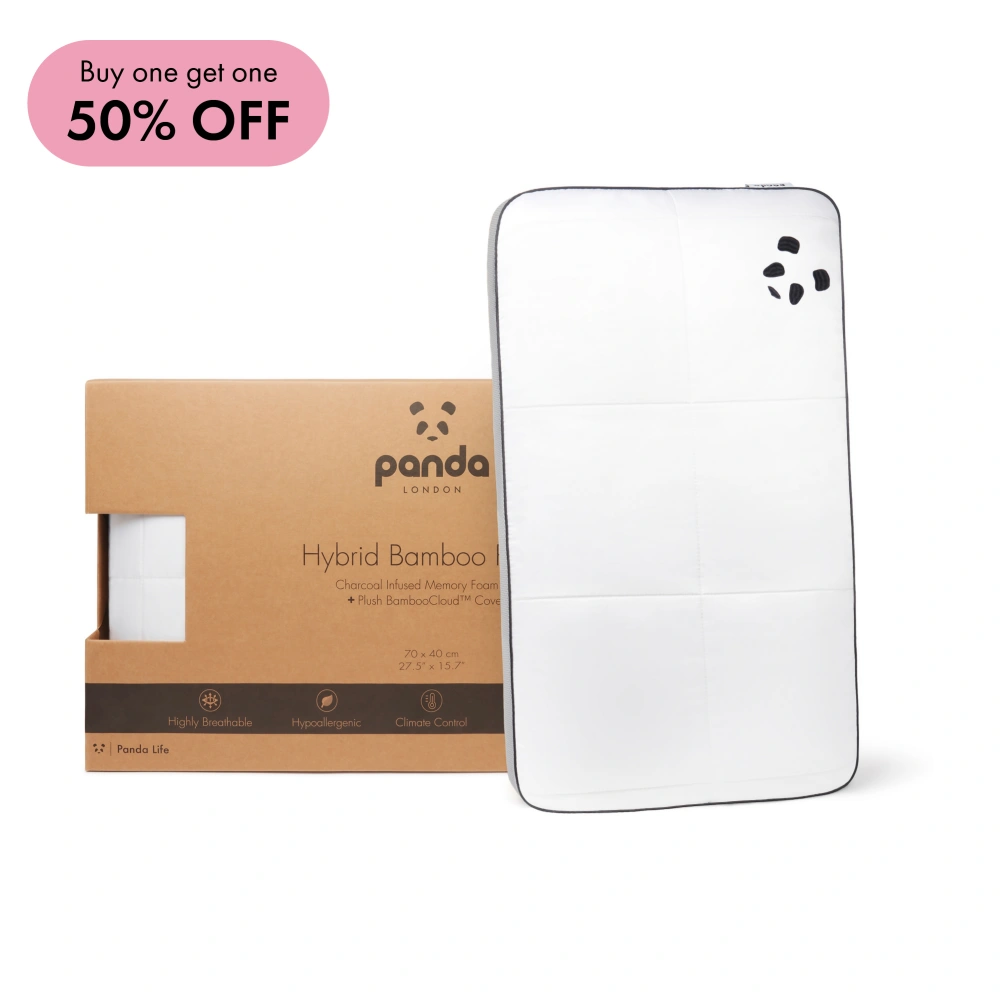
![[HybridPillow] Hybrid Pillow with Panda brand marking](http://pandalondon.com/cdn/shop/products/Hybrid-Pillow_8.jpg?v=1770077259&width=1920)
![[HybridPillow] Couples laying on Hybrid Bamboo Pillows](http://pandalondon.com/cdn/shop/files/Hybrid_Bamboo_Pillow_Product.jpg?v=1770077259&width=1000)
![[HybridPillow] Red Hair Girl sleeping on a Hybrid Bamboo Pillow](http://pandalondon.com/cdn/shop/files/Hybrid_Bamboo_Pillow_-_Red_Hair_Girl_Product.jpg?v=1770077259&width=1000)
![[HybridPillow] Guy Hugging Hybrid Bamboo Pillow](http://pandalondon.com/cdn/shop/files/Hybrid-Bamboo-Pillow-Man-holding-the-pillow-1024x1024_jpg.webp?v=1770077259&width=1024)

![[MemoryFoamPillow] Panda London Bamboo Memory Foam Pillow](http://pandalondon.com/cdn/shop/files/03_Memory_Foam_Bamboo_Pillow__alt01.jpg?v=1770077322&width=800)
![[MemoryFoamPillow] Panda London Bamboo Memory Foam Pillow girl hugging the pillow](http://pandalondon.com/cdn/shop/files/02_Memory_Foam_Bamboo_Pillow__alt02.jpg?v=1770077322&width=800)
![[MemoryFoamPillow] Panda London Bamboo Memory Foam Pillow on a Panda Topper](http://pandalondon.com/cdn/shop/files/Memory-Foam-Bamboo-Pillow-on-Bed-Topper-and-Adjustable-Straps-Shown-Lifestyle-Square-768x768_png.webp?v=1770077322&width=768)
![[MemoryFoamPillow] Panda London Bamboo Memory Foam Pillow Girl Holding Pillow Lifestyle](http://pandalondon.com/cdn/shop/files/01_Memory_Foam_Bamboo_Pillow__alt04.jpg?v=1770077322&width=800)
